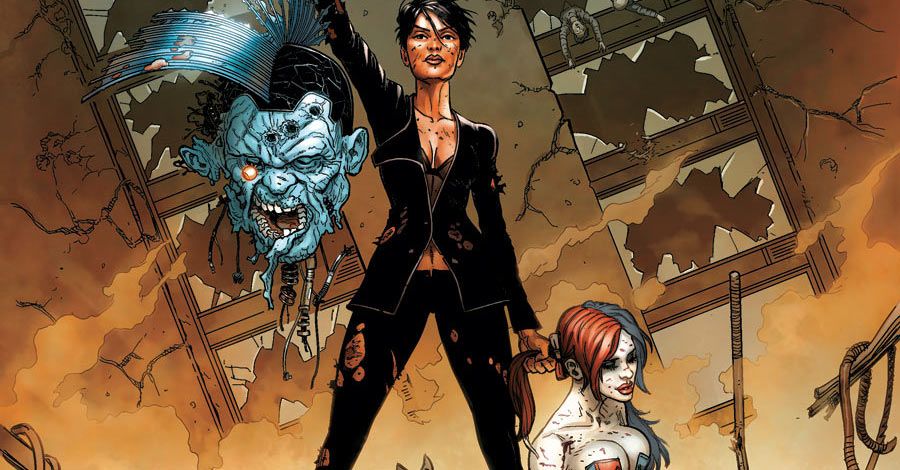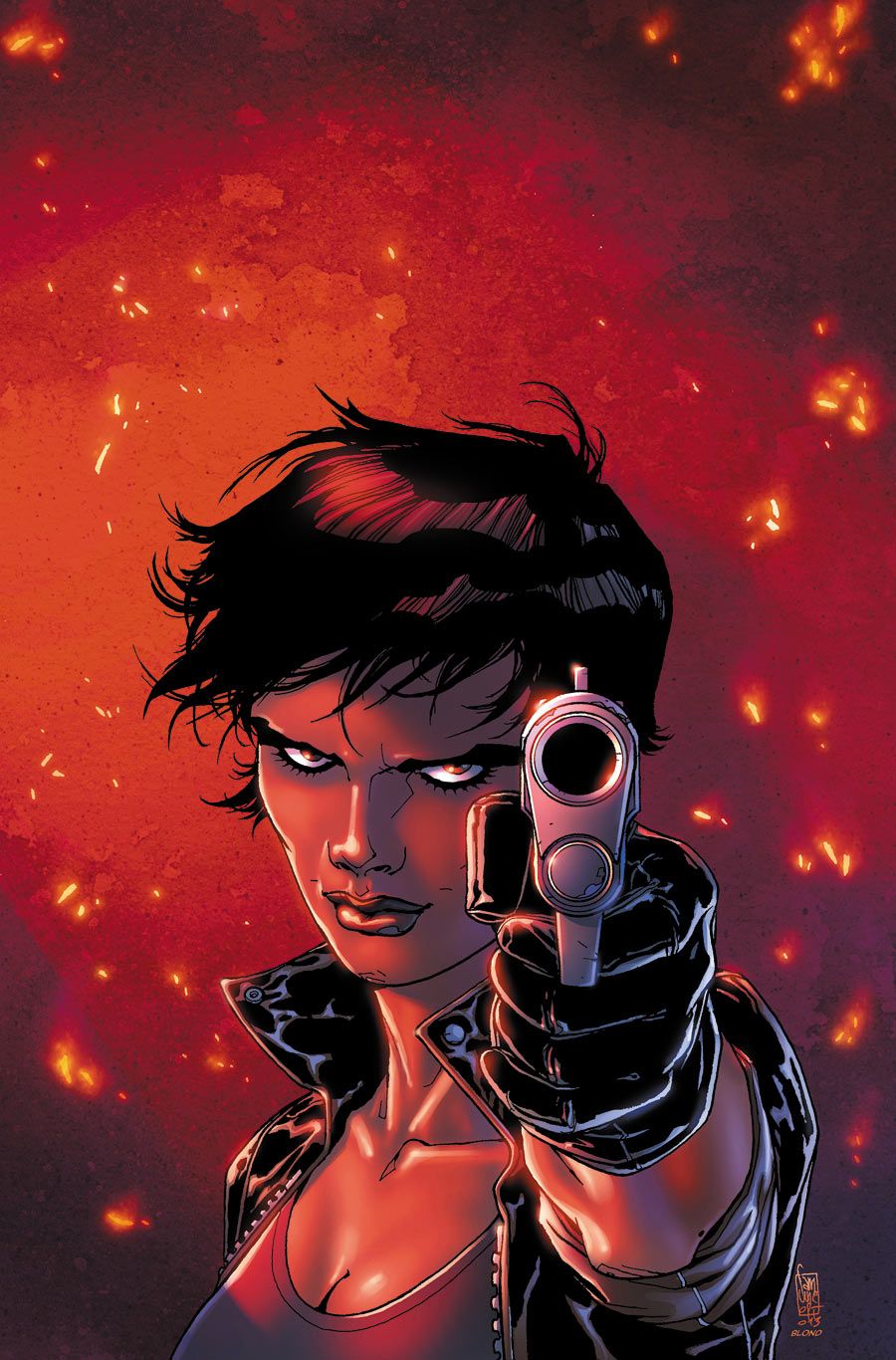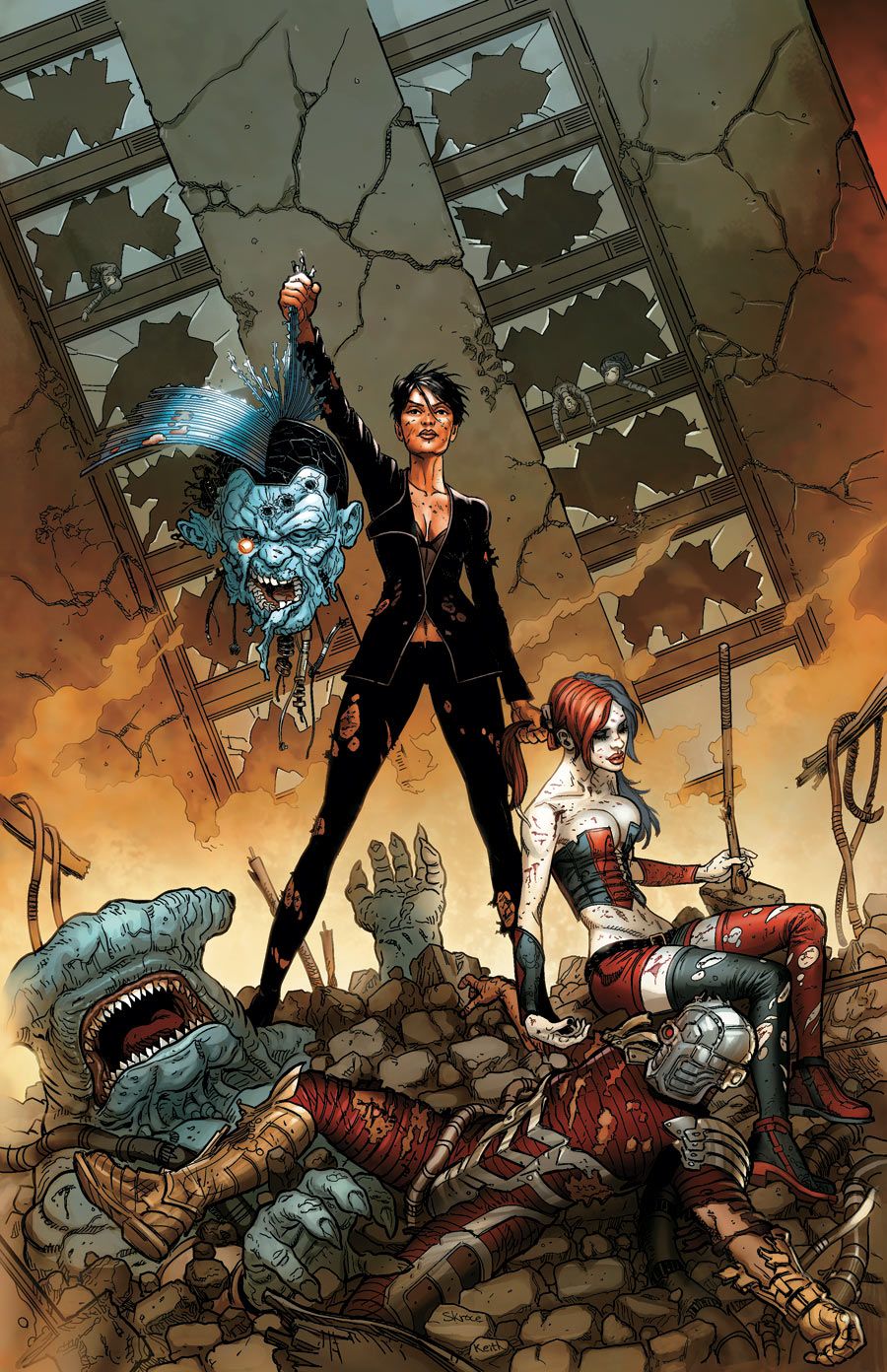Along with Lois Lane and Joker's Daughter, this March, DC Comics is giving another famous femme her own one-shot as writer -- AKA Jim Zub -- takes on Amanda Waller, pitting the hard-nosed head of A.R.G.U.S. and Suicide Squad against one of the many villains she's crossed paths with during her New 52 tenure in "Suicide Squad: Amanda Waller" with art by Andre Coelho.
Originally created in the '80s by John Ostrander, John Byrne and Len Wein, Waller took shape under Ostrander and Kim Yale's run on "Suicide Squad." An overweight, middle-aged mother and congressional aide who escaped the violence of Chicago's Cabrini-Green projects, as head of the Suicide Squad the anti-hero Waller became one of the biggest power players in the DC Universe, with ties to Checkmate and other fictional (and sinister) organizations. When "Suicide Squad" relaunched as part of the New 52 Waller got a makeover as well, transforming into a svelte young woman with a new past as a covert military operative and member of the black-ops group known as Team 7.
Another New 52 Casualty: Amanda Waller's Weight
Zub spoke with CBR about his one-shot exploration of "The Wall," how "Team 7" has fundamentally changed who Amanda Waller is and the process behind Waller's transformation from bureaucrat to New 52 soldier.
CBR News: Starting off with the basics, how did you come onto this one-shot? Did DC come to you, or did you bring them the idea of highlighting Waller as a character to explore?
Jim Zub: It was something where they came to me, but as a whole, I like the Suicide Squad concept quite a bit; I've been a big fan of that for a while. It came up in conversation, but I already knew the material and had been following the book, so I was more than happy to pitch a story idea to them and run wild with it!
Were you a fan of the Squad from the very beginning, when the Ostrander and Yale run, or are you a more recent convert?
I had started reading the book with the New 52, but I went back and read some of the older stuff afterwards, so -- both! I think that the concept of Task Force X and everything involved with it is so fascinating because you've got these villains who are being used against their will to do good things for the crimes that they've committed. Her being at the head of that -- what kind of person does it take to implement that structure or even come up with that concept, and then have the will and the strength to manage it, both through the moral implications and also all the difficulties?
So what do you think is at her core that allows her to be the sort of person who can run the Suicide Squad, A.R.G.U.S. and her various amoral operations?
This is the thing, even the way you described her as amoral I think in her mind, in terms of justification, it's not amoral. It's the classic thing they say, that a really good villain doesn't consider themself a villain, and everyone's the hero of their own story. Difficult circumstances require difficult decisions, and I think that's Amanda Waller in a nutshell. She's making the best of a terrible situation. As a normal human being in a world full of super-powered everything, whether that's heroes or villains, how do you protect people? How do you continue to have structure and laws and morality when you have those threats, when one person is an army, or at any moment magic or superpowers or cosmic whatever can invade and destroy? How do you maintain a semblance of the sanity of a normal human world?
I think that's what drives it; it's not, "Is she right," or, "Is she wrong," but all the varying degrees in between. What are the terrible decisions you have to make to protect innocent people? Are there innocent people, and everything in between those elements. The original series was really ahead of its time in that thought process, and now, in a modern world in terms of technology and global innovation, a lot of our old thoughts on the way we look at nationalism or freedom seem like they're up for grabs. That really strikes at the heart of what "Suicide Squad" is and who Amanda Waller is.
With the one-shot, are we seeing events through Waller's point of view -- are we getting a look at her life philosophy or seeing how she justifies her actions to herself?
I think it's definitely about who she is, and I want to surprise people with a lot more beneath the surface. We see her as sort of an agent of change in stories. She's putting people on missions, her nickname's the Wall, you can't get past her. You don't get a sense of who she really is in a lot of the older stories, she's always the person who makes -- I don't want to say evil, but she's making the difficult decisions to send people to do terrible things and keeping up that stone cold exterior. The nice thing about a story that's focused on her like this is that it's longer than a typical story -- it's not 22 pages it's 38 pages -- and we get to dig a little bit more beneath the surface to get a sense of who she is emotionally. I'm not putting her up on a soapbox. It's not pages of her monologue, justifying her decisions! [Laughs] Just in a broader context, we're giving you a sense of who she is and why she does what she does.
"Forever Evil" Brings Matt Kindt to "Suicide Squad" & "A.R.G.U.S."
In March, when the one-shot comes out, we're also finishing up "Forever Evil." When does the one-shot take place? Does that tie in to "Forever Evil" at all?
It essentially takes place before, but it isn't making a lot of references to it. The story has been purposely put together so new readers can pick it up regardless whether or not they know Forever Evil and all that. Obviously, it ties into who she is and Task Force X and everything else, but you don't need to know previous continuity to get onboard. It's really a good way for you to understand who is at the heart of A.R.G.U.S. and Suicide Squad, whether or not you've read those books.
So it's a standalone introduction to the character.
Right!
Along those lines, what can you say about the plot? We know someone is coming back to target her -- is there anything you can say about the foe or foes she'll be facing?
I can't say too much, as I want it to be a surprise for readers, but I definitely wanted to put her in a situation where she didn't have access to her normal resources. We think of Amanda Waller and, whether it's the technology in Belle Reve or all the normal things she surrounds herself with -- she's got the military, the Task Force X agents or whatever -- she has a buffer between her and whatever threats are out there. Part of the goal from the get-go was to strip those things away and make it about her personal determination and skill, almost getting back to, not that she isn't that person anymore, but the type of person she was in "Team 7" where she is in the field doing the thing herself, because that's the person she is. Putting her in a situation where it isn't her as a bureaucrat but her as a soldier was definitely at the heart of the story, so you can get a sense of her personally doing things instead of that sense where she's removed, behind a computer screen or on the other end of a phone telling people to go risk their lives. The audience can very easily look at that and go, "Oh, that's just a decision maker," rather than someone who looks physically and mentally capable of carrying out the stuff herself.
The pre-New 52 Waller was definitely that behind the scenes, overweight bureaucrat who was obviously not going to get physically involved in missions. Do you see this story as really firmly cementing the New 52 version as an action hero, someone who is physically capable of being part of the Squad and would have been, had she made the wrong decisions in life?
[Laughs] Right, well, this is the thing: She's obviously not a super villain. She doesn't even have those powers to rely on, so in some ways it's more heroic. If you're Superman, and you know bullets are going to bounce off, it's a little easier to jump into a firefight mentally. It's something else when any single one of those could take you out and that's the end of your story, and then making the decision to get into the fray.
At this point, she's pretty much a brand new character -- she's younger, she's thinner, she's leaping into action. Do you think readers will ever see the older, bureaucrat-version of Waller resurface, or is the soldier who she is now?
I think they are both aspects of her personality. She's been pulled into this leadership role, and it's not that she's not capable of doing it, just -- in her mind, it's not the sum total of who she is, in that she's in the situation because she can do it and because no one else will. In her mind, no one will bite the bullet and make these decisions, whether it's about what we're going to do with the super villains, or using them to keep everyone else safe, or all of the other things involved with that. The Amanda Waller in the New 52 was built off the soldier from "Team 7," so you've got that addition to her past and that different starting point. I think that's an important part of her new character. We wanted to make sure that was involved. That's the thing with the New 52 -- you're trying to take aspects that work and make it surprising without getting away from certain truths about the characters. When it's done well, it's really exciting for readers because there's enough familiarity there, but it's also something new and unexpected.
Outside of comics you teach at an art college. Does that influence or change the way you work with artists, on this or your other projects?
It definitely changes the way I give feedback. I love being involved in the process, so the more an editor wants me involved, the happier I am, whether that's approving page roughs or designs or whatever. I'm not here to overtake whatever the artist is doing; they've been put on this project for a reason and they should have first and last say on what's going on, but it's helpful to throw ideas into the mix. As a writer, it helps me think visually, so as much as humanly possible, when I'm writing, I have a vision of how it's going to look and make it something that can be drawn. Sometimes, you get the impression that people are writing movie scripts, and that has a different kind of component to it. These are more distinctive snapshot moments. So, in my head, to help me write it, I visualize how the page might go -- but I'm not here to tell an artist their layout is wrong or something like that. As long as there is room for the text, that's awesome; I love seeing what they come up with and the whole collaborative process. If they're stuck on something, I have no problem throwing some ideas into the mix or making a suggestion, but I'm not there to exert my will over their artwork.
Besides this one-shot, will fans get to see more DC work from you, or are there other projects you're working on that readers should pay attention to?
I've got a ton of stuff in the hopper, but not a lot has been announced right now, so the stuff I can talk about is frustrating, because in a handful of weeks this could be a totally different answer! [Laughter] Right now, all I can say is I'm hopeful for new projects at DC or Marvel, I'm excited about the possibility for other stuff from other publishers as well.
We're wrapping up the first arc of "Samurai Jack" over at IDW, which I'm very excited about. "Pathfinder" is getting a new story arc starting this summer over at Dynamite, and I've got the fifth storyline of "Skullkickers" starting up in March over at Image. That is just a small part of what's coming in 2014!
"Suicide Squad: Amanda Waller" #1 hits shelves March 26



